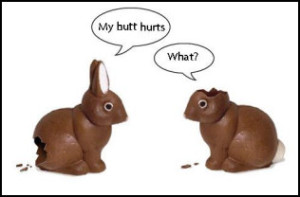Easter can be a pain in the butt for pets!
Chocolate is toxic to dogs and other pets and ingestion often results in significant illness. Chocolate is toxic because it contains theobromine, a chemical similar to caffeine and used medicinally as a diuretic, heart stimulant, blood vessel dilator, and a smooth muscle relaxant. Theobromine can be poisonous and if eaten by our pets may result in severe clinical signs, especially if they do not receive early medical treatment.
How much chocolate can my dog have?
The easy answer to this is none!
The amount of toxic theobromine varies with the type of chocolate.
The darker and the more bitter the chocolate, the more dangerous it is to your pets. Cooking or baking chocolate and high quality dark chocolate contains higher amounts whilst, milk chocolate (commonly used in Easter eggs) has less and white chocolate barely poses any threat of chocolate poisoning. The amount of fat and sugar in white chocolate, however, can still make a dog very sick and result in conditions such as pancreatitis!
This means that for a medium size dog, weighing about 20kg it would take only 25grams of baker’s or dark chocolate and 250grams of milk chocolate to potentially show signs of poisoning (Approximate figures only.)
Clinical signs of chocolate poisoning depend on the amount and type of chocolate ingested. For many dogs, the most common signs (apart from the missing egg and the remains of foil wrapper) are vomiting and diarrhoea, increased thirst, panting or restlessness, excessive urination, a racing heart rate, muscle spasms (tremors), and occasionally seizures. In older pets that eat a large amount of high quality dark or baking chocolate, sudden death from cardiac arrest may occur, especially in dogs which already have heart disease. Complications (such as developing aspiration pneumonia from vomiting) can make the prognosis for chocolate poisoning worse.
Clinical signs of chocolate poisoning can take several hours to develop, and even longer to go away. Clinical signs of chocolate poisoning can last for days, due to the long half-life of theobromine. The theobromine can even be re-absorbed from the bladder, so aggressive IV fluids and frequent walks may be necessary. It is important to seek medical attention by calling us at Vasse Vets on 9755 4455 as soon as you suspect that your dog has eaten chocolate.
When in doubt, contact your veterinarian to see if a poisonous amount of chocolate was ingested to begin with. If so, your veterinarian may want to induce vomiting, provided your dog isn’t showing any clinical signs. If a toxic amount is ingested, you should have your pet examined by a veterinarian immediately. The sooner the theobromine is removed from the body or the pet is stabilized, the better your dog’s chances. If you have the packaging please collect this so we can gain an idea as to the dose your pet has received.
Treatment depends on the amount and type of chocolate eaten. If treated early, removal of the chocolate from the stomach by administering medications to induce vomiting and administration of activated charcoal to block absorption of theobromine into the body may be all that is necessary. Activated charcoal may be administered every four to six hours for the first twenty-four hours to reduce the continued reabsorption and recirculation of theobromine.
It is very common to provide supportive treatments such as intravenous fluid therapy to help dilute the toxin and promote its excretion. All dogs ingesting chocolate should be closely monitored for any signs of agitation, vomiting, diarrhoea, nervousness, irregular heart rhythm, and high blood pressure. Often, medications to slow the heart rate (e.g., beta-blockers) may be necessary to treat the elevated heart rate and arrhythmia.
We are open as normal on Easter Saturday from 9am until 2pm, and also on Easter Monday from 11am until 1pm
Vasse Vets are available 24/7 for emergencies on 97554455. If you suspect your pet has eaten chocolate, please call immediately, do not wait and see!




